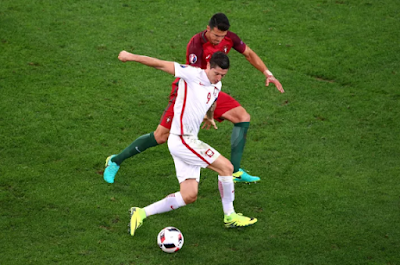Portugal saw off Poland on penalties in Marseille on Thursday to reach the semifinals of Euro 2016. Poland's Robert Lewandowski opened the scoring after just a couple of minutes, only for Renato Sanches to peg them back later in the first half. Portugal had the better of the play from thereon, though failed to take their chances and relied on a shootout to ensure their place in the final four.
Poland could hardly have made a better start to the match, breaking the deadlock after just a couple of minutes. Kamil Grosicki caught Portugal right-back Cédric napping underneath a high ball, and promptly delivered a lethal low cross into the penalty area. A brilliant run ensured Lewandowski found himself in the right place at just the right time, and he slotted the ball powerfully beyond Rui Patricio and into the back of the net.
Portugal could've been rattled, but to their credit, Fernando Santos' side steadied the ship. They started to settle on the ball, and forced Poland's defensive line ever deeper. However, with the exception of a strong penalty appeal when Cristiano Ronaldo was bundled over inside the box, they didn't give Poland's centre-halves too much to worry about.
When the equaliser did arrive, shortly after the half-hour mark, it was a combination of individual quality and good fortune. A powerful strike from Sanches on the edge of the area took a nick off the shoulder of Grzegorz Krychowiak on its way past Łukasz Fabianski, with Portugal's pressure finally telling. They continued to dominate through to the interval, though without any further reward.

Comments
Post a Comment